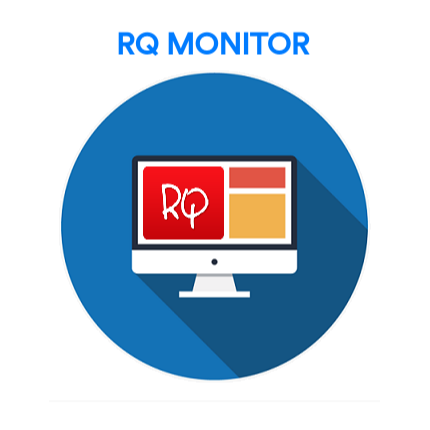Key Features • Install • Docker • Usage • Credits • Contribute • Similar Tool • License
- Redis RQ Memory Monitoring - Implemented through Lua Scripting
- Possibly RQ is not the only work your redis is doing and you want to keep a close eye on memory consumption of RQ namespace. Be little careful while executing it on production environment with large data as script may block your redis for some time.
- Send Signals to remote workers
- Using rqmonitor you can suspend/resume/delete your workers for debugging purposes which can be located on same instance running rqmonitor or some other instance in your network.
- rqmonitor internally uses fabric for sending commands to remote workers.
- Make sure the instance running rqmonitor have proper access to other instances running rq workers which can be achieved by properly configuring ssh, so make sure appropriate entries are added inside ssh_config.
- All data population through DataTables:
- Queues and Workers dashboard are rendered by client side DataTables so you get additional functionality of sorting, searching, robust pagination.
- Jobs dashboard is rendered with server side option enabled of DataTables for easy loading of very large number of jobs.(Ajax Pipeling also planned in future)
- More Ajax Less Reloading
- Once after firing up the dashboard, little to no refresh is necessary, almost every refresh is done via ajax.
- Jobs Filtering Support
- You can choose to view a set of jobs from certain queue with certain status.
- Global Actions
- You can easily delete/empty multiple queues, jobs and suspend/resume workers.
- Last but not the least is beautiful UI
- More features coming!
- Install
rqmonitorwith pip$ pip install rqmonitor
- For Docker check below.
You love docker, don't you ?
Pull rqmonitor latest docker image from dockerhub
docker pull pranavgupta1234/rqmonitor
docker run -p 8899:8899 pranavgupta1234/rqmonitor
The above command will successfully run the flask app but your redis is probably on your docker host then provide your docker host private IP for redis url via env, like:
docker run --env RQ_MONITOR_REDIS_URL=redis://<your-private-ip>:6379 -p 8899:8899 pranavgupta1234/rqmonitor
CLI options are similar to that of rq-dashboard.
Download latest version of rqmonitor from pypi and fire up your command line and type rqmonitor --help.
Usage: rqmonitor [OPTIONS]
Run the RQ Monitor Flask server.
All configuration can be set on the command line or through environment
variables of the form RQ_MONITOR_*. For example RQ_MONITOR_USERNAME.
A subset of the configuration (the configuration parameters used by the
underlying flask blueprint) can also be provided in a Python module
referenced using --config, or with a .cfg file referenced by the
RQ_MONITOR_SETTINGS environment variable.
Options:
-b, --bind TEXT IP or hostname on which to bind HTTP server
-p, --port INTEGER Port on which to bind HTTP server
--url-prefix TEXT URL prefix e.g. for use behind a reverse
proxy
--username TEXT HTTP Basic Auth username (not used if not
set)
--password TEXT HTTP Basic Auth password
-c, --config TEXT Configuration file (Python module on search
path)
-u, --redis-url TEXT Redis URL. Can be specified multiple times.
Default: redis://127.0.0.1:6379
--refresh-interval, --interval INTEGER
Refresh interval in ms
--extra-path TEXT Append specified directories to sys.path
--debug / --normal Enter DEBUG mode
-v, --verbose Enable verbose logging
--help Show this message and exit.
This software is majorly dependent on the following open source packages:
- Clone repo and create a new branch:
$ git checkout https://github.com/pranavgupta1234/rqmonitor -b name_for_new_branch. - Make changes and test
- Submit Pull Request with comprehensive description of changes
Some snippets in rqmonitor have been used from rq-dashboard.
- rq-dashboard - Yet another RQ Dashboard
Apache 2.0








